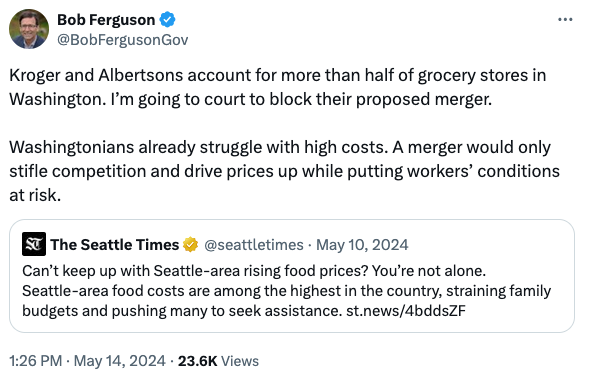Grocery store closures are exactly what some politicians asked for
- Chris Cargill

- Aug 22
- 2 min read
Updated: Aug 24
Washington state politicians - and many more around the country - cheered when the Albertsons-Kroger merger was blocked. They said it was about protecting workers and consumers. But walk through Kent, Renton, or Shoreline today and ask yourself—are families really better off?
This week, Kroger announced it will shut down at least six Fred Meyer grocery stores in Washington state. Hundreds of workers will lose their paychecks. Thousands of families will lose a neighborhood store. Shoreline’s mayor warned the closure will leave a “food desert” in his city. Union leaders admit the closures will be “devastating” for employees.
Politicians said the failed merger was a win. Today, it's a gut punch to working families.
The truth is, the Albertsons-Kroger merger was about survival. Grocery competition doesn’t just come from the store down the street anymore—it comes from Amazon dropping food on your doorstep, Walmart offering rock-bottom prices, and Costco selling everything in bulk. Albertsons and Kroger needed each other to stand a chance.
But politicians in Washington, D.C., Olympia and Seattle couldn’t resist meddling. Washington state, in fact, spent $1,100 an hour fighting the merger, even though union leaders supported it.
Politicians pressured regulators to block the merger, calling it anti-competitive. The irony? The real anti-competitive move is closing stores. An empty storefront doesn’t give families more options—it wipes them out.

Now, instead of stronger regional competition, Washington families get fewer choices, longer drives, and lost jobs. Rural and working-class communities will feel it the most.
It’s time to stop pretending that stopping businesses from adapting is somehow “protecting consumers.” If politicians truly cared about competition, they’d welcome efforts to build grocery chains strong enough to take on Amazon, Walmart, and Costco. Instead, their grandstanding has left our communities worse off.
The closures in Kent, Renton, and Shoreline should be a wake-up call. When politicians play politics with our economy, it’s ordinary people who pay the price—at the checkout line, in lost jobs, and in shuttered stores.







Boost your sustainable packaging with our advanced paper lid machine! Discover high-speed, precision manufacturing for eco-friendly lids. Get competitive pricing and reliable technology to enhance your production efficiency and meet growing environmental demands.